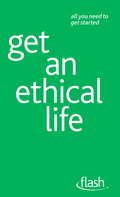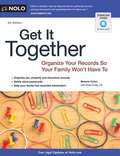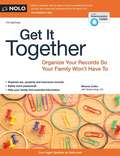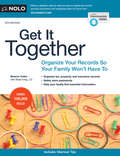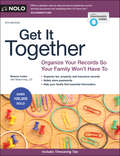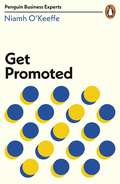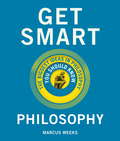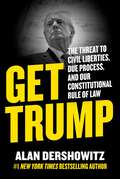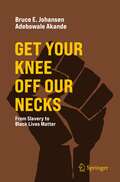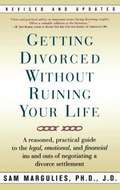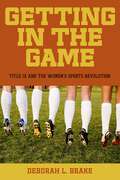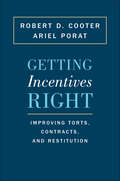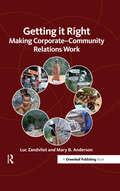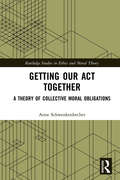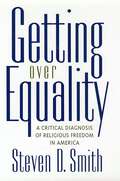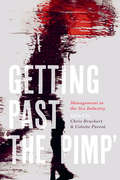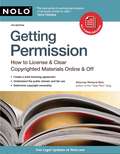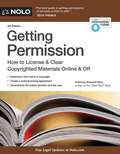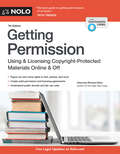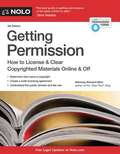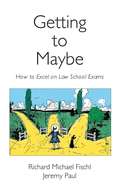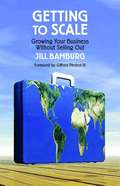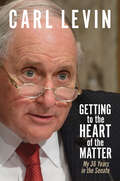- Table View
- List View
Get an Ethical Life: Flash
by Mac BrideGet an Ethical Life is a short, simple and to-the-point guide to the basic principles behind ethical, sustainable living, in a few short steps. Even if you are completely new to this way of life, in just 96 pages you will discover some essential ideas and strategies that will make a huge difference if you want to live a more sustainable, balanced life - without having to spend months learning how.
Get an Ethical Life: Flash
by Peter MacBrideGet an Ethical Life is a short, simple and to-the-point guide to the basic principles behind ethical, sustainable living, in a few short steps. Even if you are completely new to this way of life, in just 96 pages you will discover some essential ideas and strategies that will make a huge difference if you want to live a more sustainable, balanced life - without having to spend months learning how.
Get It Together
by Melanie CullenGet your life organized with the best workbook available! Paperwork and personal information isn't always easy to find, and organizing your records can seem like an intimidating task. But, whether you need to organize records for yourself, your family or your executor, Get It Together will show you how to keep track of: . instructions for survivors . secured places and passwords .final arrangements . estate planning documents . employment records . insurance policies . tax records . retirement accounts . government benefits, and . real estate records. This workbook provides a complete system for structuring a records binder and easily organizing it for your loved ones. This edition is easier to use than ever, with fully updated resources and references. - Download forms for book on nolo.com
Get It Together: Organize Your Records So Your Family Won't Have To
by Melanie Cullen Shae IrvingGet your life organized with the best workbook available! Paperwork, personal information, and passwords aren't always easy to find, and organizing your records can seem like an intimidating task. But, whether you need to get a handle on records for yourself, your family or your executor, Get It Together will show you how to organize: instructions for survivors secured places and passwords estate planning documents funeral arrangements employment records insurance policies tax records retirement accounts government benefits real estate records and more. For those concerned about sensitive information like passwords, Get It Together lets you: Securely store an unlimited number of passwords while keeping them handy. Decide whether you want to record your information electronically or by hand. Choose the way you want to organize your passwords--for example, alphabetically or by type of product or service. Easily add related notes, such as security questions. This workbook provides a complete system for structuring and organizing your information and documents into a records binder. For each topic, you will find helpful content, rich resources and step-by-step instructions. All forms are downloadable through a link printed in the book.
Get It Together: Organize Your Records So Your Family Won't Have To
by Melanie Cullen Shae IrvingGet It Together is a detailed workbook that helps you collect and organize your important papers and information. The author leads you through the process step-by-step, prompting you to find and keep track of: secured places and passwords employment records insurance policies real estate records tax records retirement accounts estate planning documents final arrangements letters to loved ones, and more. The end product will be an important and useful gift to those who wrap up your affairs after your death. Now available a companion Binder & Tab Set - search for "get it together binder and tab set"
Get It Together: Organize Your Records So Your Family Won't Have To
by Melanie Cullen Shae IrvingEverything you need to get organized Do your loved ones know where to find your life insurance policies, online banking passwords, real estate deeds, or even your will? If you’re like a lot of people, you keep important information—from the whereabouts of family heirlooms to online passwords to automatic bill-pay details—in your head or stashed in the odd desk drawer. Unfortunately, this disorganization will likely cause hassles for those who someday take care of you or your estate. Get It Together provides an easy, straightforward method to help you and others keep track of: secured places and passwords employment records insurance policies real estate records tax records retirement accounts estate planning documents funeral arrangements letters to loved ones We’ve reorganized this 9th edition to make the process more straightforward. In the first half, you’ll find the pages to create your personal planner. In the second half, you’ll find step-by-step instructions and helpful resources. With downloadable forms: organize your records using worksheets (details inside). Save the worksheets to your computer and then complete, print, and store them at your convenience.
Get It Together
by Shae Irving Melanie CullenGet your life organized with the best workbook available! Paperwork and personal information isn't always easy to find, and organizing your records can seem like an intimidating task. But, whether you need to organize records for yourself, your family or your executor, Get It Together will show you how to keep track of: instructions for survivors secured places and passwords final arrangements estate planning documents employment records insurance policies tax records retirement accounts government benefits, and real estate records. This workbook provides a complete system for structuring a records binder and easily organizing it for your loved ones. This edition is easier to use than ever, with fully updated resources and references. All forms are now downloadable at nolo.com.
Get Promoted (Penguin Business Experts Series)
by Niamh O'KeeffeAre you stuck in a career rut? Are your former peers progressing ahead of you? Are you doing all the hard work but getting none of the rewards? Are you wondering what everyone else seems to know that you don't?Asking for a promotion ranks high on the list of life's most anxiety-inducing activities. Putting yourself out there to higher-ups can be intimidating, and competition can be fierce, especially in the current economic climate. And, of course, what if they say no?But it's also one of the most important things you can do for your career. If you want to move forward in your company or field, promotions are part of the game and they won't just be handed to you - you have to work - and ask - for them. Ready to take that next step? Penguin Experts Series: Get Promoted will give you everything you need to know before the big conversation.
Get Smart: The Big Ideas You Should Know (genius test)
by Marcus WeeksCan you master the ideas of Plato, Kant, Nietzsche and Sartre? What does 'I think, therefore I am' really mean? Do you know the arguments for and against the existence of god? And what do the great philosophers tell us about knowledge and truth, good and evil? Take Get Smart: Philosophy and learn to think and talk like history's greatest philosophical minds. Packed with bite-sized briefings, shortcuts and bluffs, Get Smart: Philosophy demystifies 50 key philosophical concepts and provides you with all you need to speak out about the very biggest ideas, including: The nature of reality; Free will; Ethics; Philosophy of the mind; Justice and liberty; Relativism; Utilitarianism; Capitalism and democracy; Paradoxes and fallacies; The Social Contract; Existentialism; Metaphysics; Chinese philosophy; Beauty and art; Artificial intelligence; Human rights; Analytic, Linguistic and Continental philosophy . . . and many more.
Get Trump: The Threat to Civil Liberties, Due Process, and Our Constitutional Rule of Law
by Alan DershowitzIn Get Trump: The Threat to Civil Liberties, Due Process, and Our Constitutional Rule of Law, Alan Dershowitz—#1 New York Times bestselling author and one of America&’s most respected legal scholars—analyses the unremitting efforts by political opponents of Donald Trump to &“get&” him—to stop him from running in 2024—at any cost. Alan Dershowitz has been called &“one of the most prominent and consistent defenders of civil liberties in America&” by Politico and &“the nation&’s most peripatetic civil liberties lawyer and one of its most distinguished defenders of individual rights&” by Newsweek. Get Trump makes clear that unconstitutional efforts to stop Trump from retaking the presidency challenge the very foundations of our liberty: due process, right to counsel, and free speech. Those who justify these dangerous departures from the rule of law argue that the threat posed by a second Trump presidency is &“different&” and &“immediate,&” while the departures from constitutional norms are longer term and more abstract. Dershowitz explains that defenders of Trump&’s constitutional rights—even those like him who strongly oppose Trump politically—are sought to be silenced; their free speech rights attacked, their integrity questioned, and their careers threatened. Much of the media substitutes advocacy against Trump for objective reporting, while many in academia petition and propagandize against rights they previously valued—all in the interest of getting Trump. The essence of justice is that it must be equally applicable to all, Dershowitz notes. No one is above the law but digging to find crimes in order to influence an election does not constitute the equal application of the law. In order to assure equal application in comparable situations, he proposes two criteria for indicting a likely candidate of the opposing party: the Richard Nixon standard and the Hillary Clinton standard—and most recently, the Joe Biden standard. Get Trump warns that regardless of whether this anti-democratic effort to stop Trump from running succeeds or fails, it is likely to create dangerous precedents that will lie around like loaded weapons ready to be deployed against other controversial candidates, officials, or citizens about whom it can be argued that the danger they pose &“is different.&”
Get Your Knee Off Our Necks: From Slavery to Black Lives Matter
by Bruce E. Johansen Adebowale AkandeThe death of George Floyd on May 25, 2020, and the ensuing trial of Derek Chauvin for murder a year later has rubbed raw the bloodiest stain on the United States’ history and its world reputation. The nine minutes and 29 seconds during which Chauvin’s knee crushed the spark of life out of Floyd was not unusual in the history of the United States. Before the U.S. Civil War, slaves were routinely beaten to death for disobeying orders or running away, then often lynched. In roughly two centuries, Blacks have achieved nominal freedom. But, as this book’s opening chapter and expert essays that follow indicate, freedom has been conditional based on inequity of wealth, social, and legal discrimination. None of this is new in the United States; what is new is the number of people rising up in protest, a figure in the millions around the world after Floyd’s murder.This book supplies a readable, scholarly account of recent issues in race and racism in the United States that will be useful for general readers, undergraduate students, and their professors. It will be useful in many fields, including Black studies, other ethnic pursuits, United States history, law, criminal justice, intercultural communication, et al. The work contains a powerful historical narrative followed by several important, essays on subjects including George Floyd’s murder, the rise of the Black Lives Matter movement and many other victims of systematic racism.
Getting Divorced Without Ruining Your Life: A Reasoned, Practical Guide to the Legal, Emotional and Financial Ins and Outs of Negotiating A Divorce Settlement
by Sam MarguliesAs a leading divorce negotiator and mediator, Sam Margulies has helped thousands of couples reach fair and amicable settlements. In this compassionate guide, now updated with vital information on changes in divorce law and norms, Margulies covers the legal, financial, and emotional realities of divorce in a straightforward, reassuring style. He takes readers through every step, from making the initial decision to finalizing the agreement, including: Why mediation is now the preferred way to divorce How to avoid the conflicts that often occur after the divorce is over How to negotiate successfully even when you are angry How to manage step-family conflict in the aftermath of divorce With examples drawn from real-life cases, Getting Divorced Without Ruining Your Life explains how to protect one's own interests and negotiate a stress-free, enduring agreement that allows both partners to embark on a new life.
Getting in the Game: Title IX and the Women's Sports Revolution (Critical America #51)
by Deborah L. BrakeIn this first legal analysis of Title IX, Deborah L. Brake assesses the statute’s successes and failures, using a feminist theory lens to understand, defend, and critique the law. While the statute has created tremendous gains for female athletes, not only raising the visibility and cultural acceptance of women in sports, but also creating social bonds forwomen, positive body images, and leadership roles, the disparities in funding between men’s and women’s sports haveremained remarkably resilient. At the same time, female athletescontinue to receive less prestige and support than their male counterparts, which in turn filters into the arena of professional sports. Brake provides a richer understanding and appreciation of what Title IX has accomplished, while taking a critical look at the places where the law has fallen short.A unique contribution to the literature on Title IX, Getting in the Game fully explores the theory, policy choices, and successes and limitations of this historic law.
Getting Incentives Right: Improving Torts, Contracts, and Restitution
by Robert D. Cooter Ariel PoratHow tort, contract, and restitution law can be reformed to better serve the social goodLawyers, judges, and scholars have long debated whether incentives in tort, contract, and restitution law effectively promote the welfare of society. If these incentives were ideal, tort law would reduce the cost and frequency of accidents, contract law would lubricate transactions, and restitution law would encourage people to benefit others. Unfortunately, the incentives in these laws lead to too many injuries, too little contractual cooperation, and too few unrequested benefits. Getting Incentives Right explains how law might better serve the social good.In tort law, Robert Cooter and Ariel Porat propose that all foreseeable risks should be included when setting standards of care and awarding damages. Failure to do so causes accidents that better legal incentives would avoid. In contract law, they show that making a promise often causes the person who receives it to change behavior and undermine the cooperation between the parties. They recommend several solutions, including a novel contract called "anti-insurance." In restitution law, people who convey unrequested benefits to others are seldom entitled to compensation. Restitution law should compensate them more than it currently does, so that they will provide more unrequested benefits. In these three areas of law, Getting Incentives Right demonstrates that better law can promote the well-being of people by providing better incentives for the private regulation of conduct.
Getting it Right: Making Corporate-Community Relations Work
by Mary Anderson Luc ZandvlietA company begins exploration of future operations in a remote and rural area of a poor, but resource-rich country. The communities in this area welcome the company's interest, seeing the prospects for improved social and economic conditions. They look forward to the creation of jobs and other income opportunities, and they look forward to being connected to the outside world through the company.The company, for its part, wants to get it right with local communities. In order to understand the context in which they plan to operate as well as to demonstrate their respect for local mores, managers hire an anthropologist or a non-governmental organization (NGO) to do community surveys. They see these as the first steps for establishing good relations between the company and local communities.Five years later, a visitor to the area sees schools and clinics that the company has built and staffed for the community. He sees upgraded roads and electricity that had not existed before. He sees increased activity in the region, more people and more vehicles, as people have migrated to the area for work. But he hears the company manager complain that he spends far too much time dealing with the community's "never-ending demands" and with "local trouble-makers," and he hears community members complain that "the company has done nothing for us."This book has been written for corporate managers who are responsible for company operations in societies that are poor and politically unstable. Many such managers are frustrated with the situations they face. They try their best to run effective, profitable and beneficial operations that take account of the needs of all their stakeholders, including local surrounding communities. But, even with their best efforts, they encounter community dissatisfaction, unrest, opposition, and delays and, worse yet, threats and violence.In many ways, this book is also written *by* such managers because the information and learning it includes come directly from their day-to-day, grounded field experience. For seven years the authors have spent days and weeks at over 25 sites of companies – including (among others) BP, ChevronTexaco, Barrick, Shell, Total, and Newmont – operating in Africa, Asia, Latin America, Australia, and North America, talking with both company staff and local people. They have gathered evidence of how the daily, ongoing operations of companies interact with, affect, and are affected by the societies where they work. They have heard lots of complaints – on both sides. They have seen policies and programs, intended to establish positive relations, backfire and, instead, bring angry demonstrations at the company gate and seemingly endless negotiations and demands. They have also seen operations that are appreciated and supported by local people because of the positive impacts they have had.Both corporations and communities begin their interactions with positive attitudes and expectations, but in a short time tensions between the two rise and negative attitudes can supplant positive ones. In each location where CEP has seen this story play out, there are, of course, variations and details that reflect the specific context and local history. But the regularity and similarity of complaints across so many contexts also show that there are clear, and predictable, patterns in the processes by which company–community relations turn sour.Getting it Right reports, analyzes, and sorts the broad and varied experiences of these many corporations, bringing forward the lessons that can be usefully applied in other settings. The aim is to help corporate managers *get it right* with respect to interactions with local communities, so that they can more efficiently and effectively accomplish their production goals and, at the same time, ensure that local communities are better (rather than worse) off as a result of their presence. The book also addresses what has been learned about how companies can interact, appropriately and positively, with national governments and advocacy NGOs in ways that promote
Getting Our Act Together: A Theory of Collective Moral Obligations (Routledge Studies in Ethics and Moral Theory)
by Anne SchwenkenbecherTogether we can often achieve things that are impossible to do on our own. We can prevent something bad from happening, or we can produce something good, even if none of us could do it by ourselves. But when are we morally required to do something of moral importance together with others? This book develops an original theory of collective moral obligations. These are obligations that individual moral agents hold jointly but not as unified collective agents. The theory does not stipulate a new type of moral obligation but rather suggests that to think of some of our obligations as joint or collective is the best way of making sense of our intuitions regarding collective moral action problems. Where we have reason to believe that our efforts are most efficient as part of a collective endeavor, we may incur collective obligations together with others who are similarly placed as long as we are able to establish compossible individual contributory strategies towards that goal. The book concludes with a discussion of 'massively shared obligations' to major-scale moral problems such as global poverty. Getting Out Act Together: A Theory of Collective Moral Obligations will appeal to researchers and advanced students working in moral, political and social philosophy, philosophy of action, social epistemology and philosophy of social science.
Getting Over Equality: A Critical Diagnosis of Religious Freedom in America (Critical America #5)
by Steven D. SmithQuestions of religious freedom continue to excite passionate public debate. Proposals involving school prayer and the posting of the Ten Commandments in schools and courtrooms perennially spur controversy. But there is also a sense that the prevailing discourse is exhausted, that no one seems to know how to think about religious freedom in a way that moves beyond our stale, counterproductive thinking on this issue. In Getting over Equality, Steven D. Smith, one of the most important voices now writing about religious liberty, provocatively contends that we must get over our presumption mistakenly believed to be rooted in the Constitution that all religions are equally true and virtuous and "authentically American." Smith puts forth an alternative view, that the courts should promote an ideal of tolerance rather than equality and neutrality. Examining such controversial examples as the animal sacrifice case, the peyote case, and the problem of aid to parochial schools, Smith delineates a way for us to tolerate and respect contrary creeds without sacrificing or diluting our own beliefs and without pretending to believe in a spurious "equality" among the variety of diverse faiths.
Getting Past "the Pimp": Management in the Sex Industry
by Chris Bruckert Colette ParentThe issue of third parties in the sex industry – individuals who are neither the client nor the service provider – has become especially urgent in our current socio-political context. Surprisingly, in spite of an emergence of critical scholarship on the sex industry, as well as recommendations by key governmental committees, little attention has been extended to examining the role of individuals labelled pimps, procurers, and traffickers. Addressing the function of third parties on the street and indoors, Getting Past "the Pimp" incorporates solid empirical evidence including documentary analysis, 75 interviews with third parties, and 52 interviews with sex workers to unpack the roles and relationships of third parties in three sectors of the sex industry‒ incall/outcall, stripping, and street-based prostitution. Contrary to prevailing stereotypes that portray third parties as inherently abusive and controlling, these workers fulfill important roles and provide vital services as associates, fee-for-service hires, and agency owners or managers responsible for scheduling and arranging transportation and security. The sex industry, like mainstream businesses, rarely depend exclusively on client and worker to operate efficiently, and safely.
Getting Permission
by Richard Stim AttorneyUsing copyrighted materials? Get permission and stay legal If you plan to use any copyrighted material for your own purposes, you need to get permission first from the owners of that work. If you don't, you could find yourself slapped with an expensive and time-consuming lawsuit. Getting Permission tackles the permissions process head-on -- without the legalese. It shines the light on whom to ask for permission, as well as when -- and how much to expect -- to pay for permission. Comprehensive and easy-to-read, the book covers: the permissions process the public domain copyright research fair use academic permissions the elements of a license and merchandise agreement the use of a trademark or fictional character and much more Getting Permission includes agreements for acquiring authorization to use text, photographs, artwork, and music, whether it's found online or off. The 4th edition of this essential guide is completely updated to reflect the latest laws and court decisions. Plus, read an all-new collection of practical, real-life FAQs, based on author Richard Stim's popular intellectual property blog, Dear Rich: Nolo's Patent, Copyright & Trademark Blog. The CD-ROM that accompanies the printed version of this book includes forms or other tools; in this eBook, you'll find all those documents in the appendix or at the back of the book.
Getting Permission: How to License & Clear Copyrighted Materials Online & Off
by Richard StimIf you're using copyrighted material, don't get sued--get permission! Online or off, before you use some or all of a song, photo, book, or any other work covered by copyright law, you need to get permission first. If you don't, you could end up facing legal action from the rights-holder. This easy-to-use book shows you how to get the rights you need, with step-by-step instructions and more than 30 forms. Find out when permission is required, who to ask, and when (and how much) you can expect to pay. Getting Permission explains: the copyright permission process the public domain ("free" content) how to figure out who owns a copyright website permissions the "fair use" rule school-related permissions license and merchandise agreements (including sample contracts and other forms) and much more. The 6th edition is updated with summaries of recent copyright and fair use cases, as well as dozens of real-life questions from the Dear Rich permissions blog. Downloadable forms available at nolo.com
Getting Permission: How to License & Clear Copyrighted Materials Online & Off
by Richard StimIf you’re using copyrighted material, don’t get sued—get permission! Online or off, before you use some or all of a song, photo, book, or any other work covered by copyright law, you need to get permission first. If you don’t, you could end up facing legal action from the rights-holder. This easy-to-use book shows you how to get the rights you need, with step-by-step instructions and more than 30 forms. Find out when permission is required, who to ask, and when (and how much) you can expect to pay. Getting Permission explains: the copyright permission process the public domain (“free” content) how to figure out who owns a copyright website permissions the “fair use” rule school-related permissions license and merchandise agreements (including sample contracts and other forms) and much more. This edition is updated with summaries of recent copyright and fair use cases, as well as dozens of real-life questions from the Dear Rich permissions blog. All forms are downloadable through a special link in the book.
Getting Permission
by Richard StimUsing copyrighted materials? Get permission and stay legal If you plan to use any copyrighted material for your own purposes, you need to get permission first from the owners of that work. If you don't, you could find yourself slapped with an expensive and time consuming lawsuit. Getting Permission tackles the permissions process head on without the legalese. It shines the light on whom to ask for permission, as well as when and how much to expect to pay for permission. Comprehensive and easy to read, the book covers: - the permissions process - the public domain - copyright research - fair use - academic permissions - the elements of a license and merchandise agreement - the use of a trademark or fictional character - and much more Getting Permission includes agreements for acquiring authorization to use text, photographs, artwork, and music, whether it's found online or off. The edition of this essential guide is completely updated to reflect the latest laws and court decisions. Plus, read an all new collection of practical, real life FAQs, based on author Richard Stim's popular intellectual property blog, Dear Rich: Nolo's Patent, Copyright & Trademark Blog. With Downloadable Forms
Getting To Maybe: How To Excel On Law School Exams
by Richard Michael Fischl Jeremy PaulETHS graduate in 1970, Fischel has had a successful and quite varied career in law. Here he presents a clear and engaging study-aid designed to get prospective lawyers to quit regurgitating course outlines and to think in terms of legal analysis.
Getting to Scale: Growing Your Business Without Selling Out
by Jill BamburgRenowned academic and businesswoman Jill Bamburg shows how mission-driven entrepreneurs can preserve the values of their company while maintaining their growth and competitiveness in the marketplace.
Getting to the Heart of the Matter: My 36 Years in the Senate
by Carl LevinFormer senator Carl Levin’s memoir demonstrates the value of pragmatism, empathy, and compromise. Representing Michigan for thirty-six years in the U.S. Senate, Carl Levin, the longest-serving senator in Michigan history, was known for his dogged pursuit of the truth, his commitment to holding government accountable, and his basic decency. Getting to the Heart of the Matter: My 36 Years in the Senateis his story – from his early days in Detroit as the son of a respected lawyer to the capstone of his career as chair of both the Senate Armed Services Committee and the Senate Permanent Subcommittee on Investigations. Levin's career placed him at the center of some of our nation's most critical points in modern times: from the aftermath of the 1967 Detroit riots, to the Clinton impeachment, through 9/11 and the wars in Iraq and Afghanistan, and the 2008 financial crisis. He met with numerous world leaders, including Egypt's Anwar Sadat and China's Jiang Zemin. Getting to the Heart of the Matterrecounts Levin's experiences, thoughts, and actions during these historic moments.Consisting of seventeen chapters, the book takes the reader through Levin's early life in Detroit of the 1940s, 50s, and 60s where he met his wife, started a family, practiced law and served as the first General Counsel for the newly created Michigan Civil Rights Commission and the chief appellate defender for Detroit's Legal Aid Office. Elected to the Detroit City Council in 1969, where Levin served for eight years including four as Council president, the book describes how his fight against the Department of Housing and Urban Development's devastating housing practices in the neighborhoods of Detroit led him to run for the U.S. Senate with a pledge to make government work more effectively. Winning election six times, Levin had an illustrious career in the Senate where he challenged leaders in government and the private sector for the greater good of the nation. Levin describes how, as a Democrat, throughout his time in the Senate, he worked with Republican senators who often held different policy positions in order to find common ground to achieve national goals, and how he and his Senate staff searched for creative solutions to trade issues, support for the auto industry and manufacturing sector, U.S. military action in Iraq and Afghanistan, and efforts to protect the Great Lakes and the environment, among many other issues.Levin's hope in writing this memoir is that by sharing his deeply held beliefs about the responsibility of elected officials, the book will serve as a resource for people beginning a career in, or contemplating running for, public office. Readers with an interest in politics, history, facts, and perseverance will find kinship in this book.
